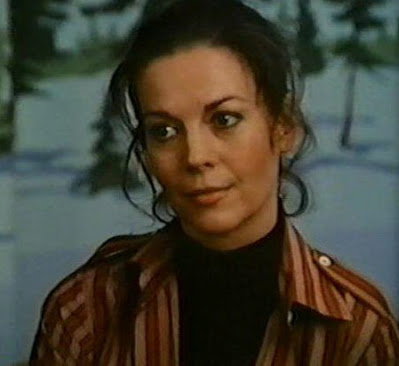ooooooooooooooooooooooooooooooooooooooooooooooooooooooooooooooooooooooooo
Brilliant performance
Natalie Wood's performance in 'The Cracker Factory' is quite simply, brilliant. The fact she wasn't nominated for an Emmy for this performance is unforgivable. Her character is a nuanced mix of and belligerence and insecurity - with real depth and humour. When she found a part she could really relate to, there was such honesty in her work.
The film itself rises above the 70's telemovie 'disease of the week' cliche, although it would have made an interesting feature film under the right director.
It's a shame that Natalie died two years after this film, it would have been fascinating to watch her grow and mature as an actress. We have such a great gallery of portraits from her - from child parts (Tomorrow is Forever, Miracle on 34th St) to ingenue roles (Rebel Without a Cause) to the leading lady material of Splendor in the Grass and Love with the Proper Stranger. She didn't do too many films in the 70's or 80's - but The Cracker Factory shows how well she had developed.
Great support by Shelley Long, Juliet Mills etc... (the music score is a little distracting though - esp. during her speech to Perry King)
I have seen the movie several times and am floored by Wood's performance each time. Highly recommended.
The film itself rises above the 70's telemovie 'disease of the week' cliche, although it would have made an interesting feature film under the right director.
It's a shame that Natalie died two years after this film, it would have been fascinating to watch her grow and mature as an actress. We have such a great gallery of portraits from her - from child parts (Tomorrow is Forever, Miracle on 34th St) to ingenue roles (Rebel Without a Cause) to the leading lady material of Splendor in the Grass and Love with the Proper Stranger. She didn't do too many films in the 70's or 80's - but The Cracker Factory shows how well she had developed.
Great support by Shelley Long, Juliet Mills etc... (the music score is a little distracting though - esp. during her speech to Perry King)
I have seen the movie several times and am floored by Wood's performance each time. Highly recommended.
oooooooooooooooooooooooooooooooooooooooooooooooooooooooooooooooooooooooooooo
Natalie Wood startingly good as an alcoholic
I had read the book by Joyce Burditt -- even wrote her a fan letter, so was prepared NOT to like this television movie. Boy, was I wrong. Natalie Wood plays a wise-cracking suburban mom with a severe alcohol addiction. She loses control in a supermarket and ends up on the seventh floor of a hospital where they put the addicts and mentally ill. She has a crush on her psychiatrist and a wonderfully warm relationship with the night supervisor played by Juliet Mills. She confronts the pain she puts her family through, especially the children. Despite the serious subject matter, she is so charming and witty you can laugh and then cry with her. Highly recommend.
ooooooooooooooooooooooooooooooooooooooooooooooooooooooooooooooooooooooooooo
An underrated TV movie.
Though it's a little dated and the variety of psychiatric stereotypes is a little annoying, but really it's a very good TV movie that I wish were available on video. It's one of Natalie Wood's best performances and she captures the Cassie Barrett character right on. The Cleveland setting gives it a great middle America setting and Marian Mercer, Shelley Long (before "Cheers") and the supporting cast are as up for this as is Natalie.
It's about alcoholism and promotes AA but doesn't go overboard in preaching to us. To the contrary, The "Cassie" character, thanks to the writing and to Natalie Wood, kick the wind out of the "typical" therapy people and methods.
It's about alcoholism and promotes AA but doesn't go overboard in preaching to us. To the contrary, The "Cassie" character, thanks to the writing and to Natalie Wood, kick the wind out of the "typical" therapy people and methods.
ooooooooooooooooooooooooooooooooooooooooooooooooooooooooooooooooooooooooooooooo
The Brilliance of Natalie Wood
Having just finished Suzanne Finstad's biography of Natalie Wood, I was eager to see The Cracker Factory because it was one of Natalie's favorite roles and a performance that she was very proud of. I have seen almost all of Natalie's films, and after watching this one, I can definitely say that it is perhaps her best work as an actress. Don't get me wrong, she was excellent in all of her films, but in The Cracker Factory, her acting was sheer brilliance. She was extremely convincing as Cassie, a depressed alcoholic housewife who drifts in and out of mental treatment. The role not only called for tough dramatic acting, which Wood of course tackles excellently, but also calls for an actress that has great comic timing due to Cassie's acerbic wit, which Natalie displays effortlessly and hilariously.
ooooooooooooooooooooooooooooooooooooooooooooooooooooooooooooooooooooooooooooooooo
The book IS better
Of course, the book is usually better. The author has time to develope the characters, while the film makers do not. That having been said, "The Cracker Factory" is a very good movie. I was pleasantly surprised. Natalie Wood did a remarkably good job of bringing Joyce Burditt's "Cassie" to life. The supporting cast was also good, especially Juliet Mills as Tinkerbell, the night nurse. A good book to read, a good movie to watch, either way, you won't feel let down.
Of course, the book is usually better. The author has time to develope the characters, while the film makers do not. That having been said, "The Cracker Factory" is a very good movie. I was pleasantly surprised. Natalie Wood did a remarkably good job of bringing Joyce Burditt's "Cassie" to life. The supporting cast was also good, especially Juliet Mills as Tinkerbell, the night nurse. A good book to read, a good movie to watch, either way, you won't feel let down.
oooooooooooooooooooooooooooooooooooooooooooooooooooooooooooooooooooooooooooooooo
Natalie Wood Shines!
Burt Brinckerhoff's exceptional made-for-television movie "The Cracker Factory" based upon the Joyce Rebeta-Burditt book of the same name offers a phenomenal performance by the late, great Natalie Wood. Natalie Wood shines as Cassie Barrett, a suburban alcoholic housewife who's in and out of the local hospital mental ward. She gives a rare look into the turbulent life of a wife and mother who suffers from depression, alcoholism and slight mental difficulty. Wood's Cassie Barrett is a spunky, bright individual looking for answers as to why she can't seem to handle her own life, while others do. Wood is warm, witty, intelligent and adds a special glow to this perceptive film.
ooooooooooooooooooooooooooooooooooooooooooooooooooooooooooooooooooooooooooooooo
Vastly Underrated--One of Natashia's Best Performances
Yup it's made for TV not a major Hollywood studio production supported by all it's "Star Making Machinery", (which was in place in Wood's early days). NONETHELESS There is much to be admired and appreciated in this tour de force perfornance. Made NO LESS Relevant with the passing years NOR with the passing of Ms Wood herself where Booze was by all believable accounts a huge factor. It was by all reputable accounts a night of drunken brawling. JR has some 'splaining to do' Still! Overall though the message here is "Don't hide behind the "disease model" of addiction. Take accountability.
Yup it's made for TV not a major Hollywood studio production supported by all it's "Star Making Machinery", (which was in place in Wood's early days). NONETHELESS There is much to be admired and appreciated in this tour de force perfornance. Made NO LESS Relevant with the passing years NOR with the passing of Ms Wood herself where Booze was by all believable accounts a huge factor. It was by all reputable accounts a night of drunken brawling. JR has some 'splaining to do' Still! Overall though the message here is "Don't hide behind the "disease model" of addiction. Take accountability.
oooooooooooooooooooooooooooooooooooooooooooooooooooooooooooooooooooooooooooooooo
Based on the best-selling novel by Joyce Rebeta-Burditt, the made-for-TV Cracker Factory originally aired on March 16, 1979. Natalie Wood stars as alcoholic Cleveland housewife Cassie Barrett, who after attempting suicide is shipped off by her family to a psychiatric ward. It's not the first time Cassie has been in "the cracker factory", but the doctors continue to hope that she'll eventually learn to grasp reality and stop hiding behind her boozing and blustering facade. As before Cassie resists the trappings of normality; this time, however, she may end up in the "factory" to stay if she doesn't at least try to help herself. Alternating sombre tragedy with moments of raucous comedy, Cracker Factory is an outstanding tour de force for Natalie Wood.
oooooooooooooooooooooooooooooooooooooooooooooooooooooooooooooooooooooooooooooooo
This is a digitized version of an article from The Times’s print archive, before the start of online publication in 1996. To preserve these articles as they originally appeared, The Times does not alter, edit or update them.
AHONG the more prominent of this weekend's offerings are two new television movies. both on ABC. Tonight's, at 9, is called “The Cracker Factory.” Sunday's, also at 9, is “The Jericho Mile.”
Ken Kesey's “Cuckoo's Nest” was a state mental institution. “The Cracker Factory.” adapted by Richard Shapiro from a novel by Joyce Rebeta‐Burdit, involves a “short‐term rehabilitative psychiatric center” in Cleveland. This becomes the home away from home for Cassie Barrett, played with disarming honesty and strength by Natalie Wood, who just recently got pushed around in the television version of “From Here to Eternity.”
Cassie, suffering fits of depression, has taken to alcohol. She is harassing her husband, neglecting her children and making ineffectual suicide attempts with children's aspirin. She is returned to the center after only six months after her first stay. She tells the other patients: “I guess I've fallen down the rabbit hole again.” •
The sources of Lassie's problems are never made clear. Crying that she misses her dead father, she describes herself as a run-of-the-mill depressive. The doctors say she is arrested emotionally at the level of a 12-year-old. On the other hand, she may be nothing more than an old‐fashioned alcoholic.
With the help of sympathetic Dr. Alexander (Perry King), Cassie inches along toward coping. From a Roman Catholic background, she talks of the crown of thorns worn by her mother (Vivian Blaine) and of her husband (Peter Haskell) climbing down off his cross once a week for some human contact.
Continue reading the main story
When the insufferably smug parish priest visits her with theories about her depression stemming from the use of birth control methods, Cassie sends him running with blunt references to masturbation. Meanwhile, she is getting more comfort and support from the other patients, all obviously disturbed but not without startling flashes of insight.
“The Cracker Factory” has a perhaps inevitable quota of stock characters and pat perceptions. But it also has offbeat compassion and surprising moments of humor, all held together with solid performances, with Miss Wood providing the crucial dramatic spark.
In “The Jericho Mile,” Rain Murphy is a convict serving a life sentence for killing his father. He is a loner, rarely talking to other inmates. His one passion, his only outlet for emotional release, is running. He becomes the looney, dubbed Lickety‐Split, who is constantly running around the borders of the prison yard.
When a prison official finally decides to clock Murphy, it's discovered that he is running a mile in close to four minutes. A college coach is contacted and Murphy begins professional training with the eventual goal of qualifying for the Olympics.
This may sound suspiciously like another one of those easy inspirational tales, destined to end with a completely rehabilitated Murphy winning the big Olympics race as thousands cheer. It's not, at least not to that unrealistic extent. Instead, Murphy's quest becomes a catalyst for adjusting the perceptions of the other prisoners. Tensions, primarily racial, are created and examined in frequently powerful close‐up.
Once again, outstanding performances are on tap. As Murphy, Peter Strauss, the three-piece-suit brother of “Rich Man, Poor Man,” departs from his usual performance images to become an intense misanthrope in long hair and mustache. Mr. Strauss demonstrates very impressively that he is capable of stretching himself as an actor.
Richard Lawson, Roger E. Mosley, Brian Donnehy and Miguel Pinero are also extremely effective. Directed by MiChael Mann, who co‐authored the script with Patrick J. Nolan, “The Jericho Mile” (the title has something to do with walls crumbling down) was filmed inside California's Folsom State Penetentiary.
Elsewhere on the schedule, at 11:30 Sunday morning, “Tony Brown's Journal” can be seen on WNBC‐Channel 4. Mr. Brown used to be on public television with “Black Journal.” Now, with PepsiCo as sponsor, he is being syndicated to commercial outlets, with his agency claiming a national lineup of about 80 stations.
These days, Mr. Brown clearly means to accentuate the positive. This week's “Journal,” entitled “In the Black,” examines blacks in the context of the general consumer market. The black segment of that market is big S80 billion a year — and getting bigger. Stressing that “too much emphasis is put on images of blacks as a disadvantaged community” Mr. Brown and his guest experts note some of the upbeat statistics: 56 percent own their own homes, 52 percent have credit cards, and so forth.
Occasionally, the claims invite challenge. Mr. Brown says, “We're becoming the main ethnic group in big city, U.S.A.” But recent demographic studies indicate that Hispanics will soon form the country's largest minority group. On the whole, however, Mr. Brown's positive points are well taken.
At 8 P.M. Sunday, on Channel 13, “Arthur Fiedler: Just Call Me Maes- tro” catches the famous Boston Pops conductor in a documentary which, while not quite as candid as a recent “60 Minutes” segment, is much more than a flattering publicity release. The maestro is seen rather clearly, grumpiness and all.
Convinced that ‐he who rests, rots,” the octogenarian is seen bouncing away on the podium, riding horses and fire engines, grouching about signing autographs for youngsters (“I don't like children”) and stirring a drink with his baton. He is also caught growing old, sadly confronting the fact that he may have to slow down a bit. (There is no mention of his recent brain operation.)
With his orchestra, he is demanding — losing his temper one minute, pampering the musicians the next minute. One orchestra member concedes that the musicians sometimes “look down their noses” at the Pops repertory, referring to the organization as “Fiedler's Concentration Camp.” But everyone agrees that the maestro is “a real original.” As someone remarks, “He became an institution.” This clear‐eyed tribute was produced by William Cosel.
ooooooooooooooooooooooooooooooooooooooooooooooooooooooooooooooooo
MY WEB PAGE TO NATALIE WOOD MOVIES










.jpg)





















































.jpg)







.jpg)





.png)




.jpg)






.jpg)













.jpg)


.jpg)










.jpg)



.jpg)

.gif)

.jpg)



.jpg)

















.jpg)
.jpg)

.jpg)
.jpeg)

No comments:
Post a Comment